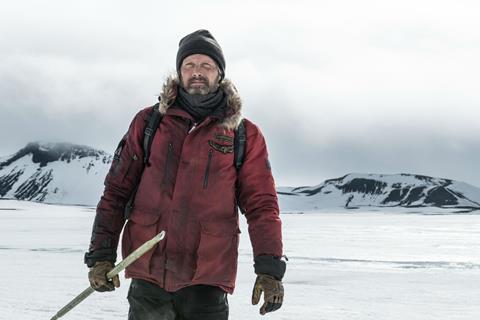Mads Mikkelsen stars as a downed airman struggling to survive in Joe Penna’s gripping tundra-set debut

Dir. Joe Penna. Iceland/US. 2018. 97 mins.
One man’s struggle for survival is served straight-up and well-chilled in Brazilian YouTube phenomenon Joe Penna’s debut feature. There’s plenty to admire in this trim, nearly dialogue-free 97-minute drama, not least Mads Mikkelsen’s raw performance as a downed airman waiting for rescue in the Arctic wastes, and the widescreen majesty of the Icelandic landscapes that stand in for the film’s polar setting. But there’s little thematic nuance in a film that has one overriding strategy – to turn up the dramatic volume notch by notch.
It’s a smart move – very nearly an arthouse one – to open after the disaster, not with it
Picked up by Bleecker Street for North America and selected international territories on the eve of its Cannes debut, where it played in the genre-oriented Midnight sidebar, Arctic does what it says on the box in a tense yet surprisingly understated way, given the indie pop aesthetic of the YouTube clips and ads that made Penna famous. While the director’s past production won’t be much of an audience benchmark for Arctic, other survival movies will. The film’s closest cousins are solo tales of human resourcefulness and resilience in the face of ever-increasing danger such as 127 Hours and All Is Lost. But Arctic has a twist: this time round, the hero has somebody else to keep alive, not just himself.
It’s a smart move – very nearly an arthouse one – to open after the disaster, not with it. When we first meet Mikklelsen’s character Overgård, he’s meticulously clearing snow away from the tundra to create what is revealed to be a giant SOS sign. He’s clearly been stuck here for a while, holed up in a crashed prop plane somewhere in this icy desert.
A bright, crimson-jacketed figure in a waste of white, Overgård goes through a set routine designed to keep body and hope together: checking for bites from the fish under the ice on the lines he’s rigged up over a frozen lake; trudging through the snow to high ground in order to crank a hand-winched emergency locator transmitter; forcing himself to keep to a rigid timetable, his harrowed, driven face suggesting that despair is easier to live with if you can divide it up into chunks of focused time.
An ominous polar bear sighting is soon followed by a moment of desperate hope, but the helicopter that has been sent to rescue Overgård is itself dashed to the ground by a blizzard – leaving him to care for the one survivor, a female co-pilot (Maria Thelma Smáradóttir) who is seriously wounded, and will spend most of the rest of the film in a semi-comatose state.
Survival films so often coerce jeopardy out of uncharacteristic moments of stupidity, and Arctic is no exception. After Overgård has set out on foot, dragging his injured charge on a sledge behind him (itself a questionable decision), there’s at least one tension-racking setback that will have the audience screaming “But why didn’t he just…?”
Better to focus on the smaller moments, which is what Arctic does best: the joy of finding a disposable lighter in the downed helicopter, the satisfaction of covering another few hundred metres of tundra, and having just enough energy left to dig a snowhole. An electronic score that is big on long-held Mahler-like chords underlines both the majesty of the film’s implacable natural setting, as well as the grace notes and sombre basslines of the small human drama which is unfurling here. And if there’s ultimately something just a little too linear in the main character’s near silent progression, there’s no denying the director’s efficient management of a crescendo we’ve seen so many few times before.
Production company: Armory Films
International sales: XYZ Films, francesca@xyzfilms.com
Producers: Christopher Lemole, Tim Zajaros, Noah C. Hauessner
Screenplay: Joe Penna, Ryan Morrison
Production design: Atli Geir Frétarsson
Editing: Ryan Morrison
Cinematography: Tómas Örn Tómasson
Music: Joseph Trapanese
Main cast: Mads Mikkelsen, Maria Thelma Smáradóttir
























